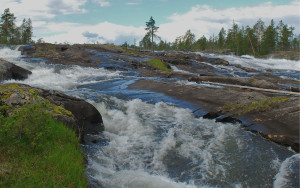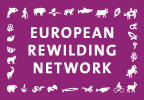This October, the 12th web-based seminar of the European Rewilding Network took place through our online platform. Members from various European countries gathered to discuss and exchange knowledge about the restoration of river systems and how to involve communities. Two successful showcases were presented (Sweden and Finland) and participants learned what it takes to bring change for nature and local wildlife, as well as for its people.

Rewilding Europe regularly organizes webinars for members of the European Rewilding Network (ERN) to actively discuss rewilding related topics and share knowledge and experience amongst each other. The network currently has 49 members located in 24 countries all over Europe. During the webinar, two network member organisations from Sweden and Finland presented their successes stories to participating members.
Jan Isaksson from the local association for the Pite River (Pite Älvs Ekonomiska Förening) gave insight in the work going on in Lapland, Sweden. Being a partner of Rewilding Lapland, this community-based river organization collaborates with Rewilding Europe in the Lapland rewilding area. The association is a cooperation of four Pite river municipalities and landowners, and owns partial fishing rights on the river. Jan showed to the participants how the Pite River and its tributaries looked like in the past when logs were still transported from inland regions to the coast. In these former times, watercourses were extensively adjusted to enable timber transport.

Restoration work by the association is about taking down lateral stone dams and by doing so, the river is brought in a much more natural state again, in which it can take its own course once again. An astonishing amount of work is ongoing in both the river and its tributaries. In addition, the association is working to create suitable spawning grounds for species like brown trout. The restoration work supports fish migration and contributes to an increase in numbers of fish and other species like pearl mussels. The long-term vision is to create benefits for local people and provide new business opportunities through nature based activities such as sustainable fishing (catch & release) and wildlife watching.
Tero Mustonen, president of Snowchange Cooperative, presented the Finland based Jukajoki restoration project that became the member of ERN this summer. The restoration project takes place in a watershed area seriously impacted by human influence, mainly due to peat extraction that is taking place since the 1950’s. In addition, there is a huge challenge connected to impact of climate change. Historic temperatures of 37˚C noticed in 2010 were followed by extreme rainfall. The impact from anthropogenic activities has been devastating; waters became highly acid and fish were dying massively in 2010-2011.
Local fishermen took matters into their own hands since authorities kept silent. In 2011 this resulted in a restoration plan that takes into account historical data and traditional knowledge about the area to set a baseline for the ecological restoration of the entire watershed. Collaborative management of villagers, fishermen, hunters and conservationists is the key in this process. Restoring spawning sites for brook trout and Atlantic salmon is one of the important goals. The Linnunsuo wetland is a central part in the restoration work, now acknowledged as an important bird area as there is a variety of waterbird species coming back. The region is also home to different mammal species like wolverine, moose and brown bear. With the increase of the number of annual visitors to the area, sustainable wildlife watching activities are extending the touristic season and providing a new source of income to the local community.
The two successful restoration approaches presented in this webinar showed a promising way forward in ecological restoration (i.e. rewilding) with strong community involvement as a key success factor. During the discussion it was evident that there are similar challenges in different rewilding settings, being river, sea or land based.
 The European Rewilding Network aims to actively share information, knowledge, experience on restoration and rewilding work throughout the continent, and stimulate cooperation to help the rewilding moving forward. Rewilding Europe is encouraging inspiring rewilding initiatives to apply for membership. For more information on how to apply, see here.
The European Rewilding Network aims to actively share information, knowledge, experience on restoration and rewilding work throughout the continent, and stimulate cooperation to help the rewilding moving forward. Rewilding Europe is encouraging inspiring rewilding initiatives to apply for membership. For more information on how to apply, see here.
